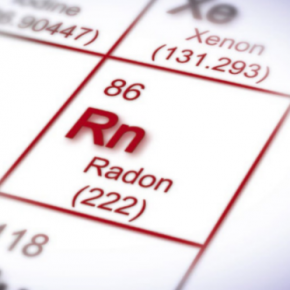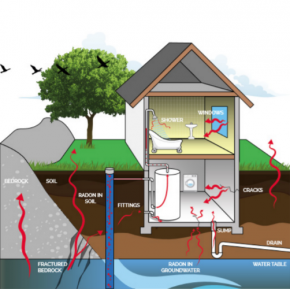
What is Radon and how can we protect our homes?
Delta Membranes discusses the details of Radon gas, where you might find it, and how to protect a structure from the gas.
Radon gas is created when natural radioactive uranium slowly decays and can be found in all rocks and soils in the UK. Certain parts of the UK will have higher concentration levels than others though – Click here to check whether you are in a high Radon concentrated area.
This radioactive gas is, colourless, odourless and tasteless. Radon is measured in becquerels per cubic metre of air (Bq m-3) and specialist equipment is required to detect it. The average level of Radon in UK homes is 20 Bq m-3. For levels below 100 Bq m-3, individual risk remains relatively low and not a cause for concern. However, the risk to health increases as radon levels increase.
Radon can migrate into any building that is built over a source. If Radon accumulates in a building, it increases the risk of lung cancer for occupants. Radon is the cause of 15% of lung cancers worldwide (World Health Organisation ‘WHO’ 2009) and the main cause of lung cancer in non-smokers and is responsible for over 1100 deaths in the UK every year.
Research published earlier this year has found that radon levels are increasing in buildings and homes due to the changes we are making to building efficiencies (such as energy efficiency). This in turn will lead to an increase in the number of lung cancer deaths attributable to radon exposure.
 Protecting structures from Radon
Protecting structures from Radon
Ground Gas Protection Systems can be used on new, retrofit and refurbishment construction although design considerations are more complex on retrofitted projects. Forward-thinking manufacturers, such as Delta Membrane Systems Limited, have sought to test all our products on their safety, reliability, high-quality and gas permeability.
Manufacturing flexibility has never been as important for the construction industry as it is today. The permeability of gas through a membrane is a critical factor when it concerns the ability of the lifetime of a building or structure.
Through extensive research we can state all our Cavity Drain Membrane Systems (CDMs) offer radon protection with a low permeability rate. Whilst, our MemTech range of Ground Gas Protection Membranes offer complete protection from Radon, Hydrocarbons, Methane, Carbon Dioxide and Volatile Organic Compounds (VOCs).
Delta Membrane Systems,
Delta House,
Merlin Way,
North Weald,
Epping,
Essex,
CM16 6HR
United Kingdom
Visit Delta Membrane Systems' website
Visit Supplier's page
Latest news

22nd November 2024
Insight Data: Using Marketing Data to Build a Successful Business in 2025
Alex Tremlett, Insight Data’s Commercial Director, discusses the challenges for construction firms in 2025 and shares six strategies for success…
Posted in Articles, Building Industry News, Building Services, Information Technology, news, Research & Materials Testing
22nd November 2024
Purplex: A tough Budget, but opportunity still knocks
Incoming governments, especially those with significant mandates, inevitably come into power on a tidal wave of optimism coupled with hope that ‘Things can only get better’. Andrew Scott, MD of construction-focused, full-service agency Purplex, talks…
Posted in Articles, Building Industry News, Building Services, Information Technology, news, Posts, Research & Materials Testing
22nd November 2024
Pop Up Power Supplies Gets Arty in Yorkshire
Pop Up Power Supplies has installed 13 new electricity units at The Hepworth Wakefield – read more in this article…
Posted in Articles, Building Industry News, Building Products & Structures, Building Services, Case Studies, Civil Engineering, Facility Management & Building Services, Garden, Hard Landscaping & Walkways, Landscaping, Posts, Restoration & Refurbishment, Retrofit & Renovation
22nd November 2024
OPT Services Revolutionises Fibre Cable Capping with Eco-Friendly Innovation
UK-based OPT Services has unveiled SlimLine™ Capping, a groundbreaking fibre cable protection solution that promises to deliver significant environmental and installation advantages to the fibre optic industry.
Posted in Articles, Building Industry News, Building Products & Structures, Building Services, Facility Management & Building Services, Information Technology, Innovations & New Products, Sustainability & Energy Efficiency
 Sign up:
Sign up: